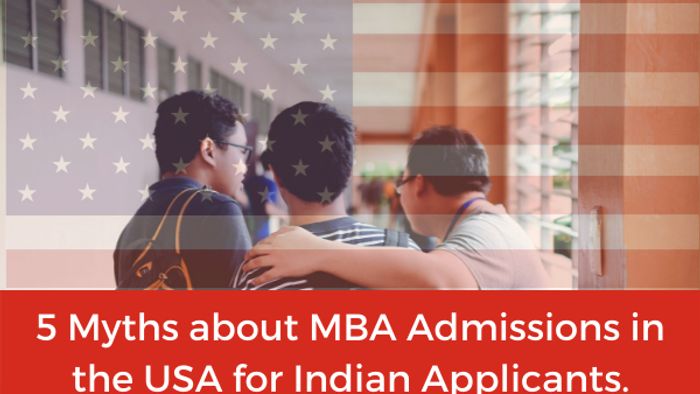5 Myths about MBA Admissions in the USA for Indian Applicants

- Sep 29, 2021,
- Updated Sep 29, 2021, 12:21 AM IST
MBA being one of the first preferences by Indian students after their graduation, is presently among the most pursued postgraduate degrees. Every year, lakhs of students choose MBA for their higher studies, and this category is so huge that it sometimes even outnumbers local candidates. However, regardless of such a massive volume of applicants each year, the program still encourages students to pursue top MBA programs abroad.
In India, candidates from the IT sector primarily shift their careers towards Business Management by pursuing MBA in the USA after graduation. Besides, a considerable number of students from the medical/administrative industry, law, and other sectors also choose MBA for their post-graduation in the top B-schools.
Unfortunately, a few myths mainly hinder Indian applicants from applying for MBA admissions abroad, especially in the US. This article will look at the top 5 myths about MBA admissions in the USA for Indian students.
5 Myths about MBA in USA
Myth 1: Top MBA programs in the USA do not prefer a 3-year bachelor's degree
Unlike the traditional bachelor's degree in India, graduation in America constitutes a total of 4 years time period. This is a major reason most Indian applicants are concerned about applying for admissions in top B-schools in the US. Considering this fact, we can say it to be a partial truth since most of the business schools in the US hesitated to accept a 3-year bachelor's degree until a few years back. However, it is no longer considered an important factor to pursue a top MBA program in European countries with time.
Nowadays, a 3 years degree is very common in the US and the European countries themselves. As a result, it is widely accepted in most European MBA programs today. This includes top programs from UCLA Anderson and Yale SOM, and Vanderbilt also accepts a 3 -year bachelor but prefers a WES accreditation and validation.
However, a few B-schools in the USA, including Stanford and Berkeley, can be considered an exception. But that does not seem to be a significant problem for the Indian applicants since they can still apply to more than 35 top MBA programs in the US.
Myth 2: Top MBA programs in the USA prefer international experience and exposure
Since most Indian applicants lack international experience, they are anxious about the thought that MBA programs in European countries emphasise previous international experience and exposure. Luckily, it is not a fact. Although having prior experience is preferable and some programs might give extra attention to it.
And it might even increase your chances of being better placed if you have spent a few months abroad, probably out of Asia and the Middle East. But applicants with no international experience hold equal chances and can freely apply for the admission process in any of the top MBA programs in the US.
Perhaps you can now work with a diverse team having different cultures and nationalism directly from your home. It is the least preferred in most of the European programs. Instead, having good cultural knowledge and intelligence can be more fruitful than having any international experience.
Myth 3: Taking the GMAT online exam has no benefits
If you plan to pursue your MBA in the USA, you should probably appear for the GMAT. You can either take the GMAT online test or the in-person test. There are no such advantages or disadvantages of taking the GMAT online tests over the in-person GMAT exams. And even if there are any, consider them negligible.
Myth 4: An average GMAT score is considered a good sign for Indian applicants
Even though an average score in the GMAT can help you get placed in most top MBA programs, it is not always guaranteed. In 2020, the average GMAT scores from most of the leading institutions were refused in the top MBA programs. This happened due to the effects of the post-pandemic. Besides, having an average score may not always be helpful to stand out in the competition. Since the average GMAT score is considered for the entire class rather than any particular geography, other candidates share the same potential as you.
Hence an Indian applicant from top schools such as the IIT's should look for adding an extra 20 - 30 points over the average score to stand above the competition. In other words, if, say, the average score for a particular MBA program is 600, try to fix your target at 620 - 630 points. That is indeed the key to maintaining your safe zone, and you can be at an advantage.
Myth 5: Possessing the quality of Social Leadership is valued over any other activities
Undoubtedly, having social leadership qualities can benefit an individual in its way, but it cannot be considered senior to having other extra-curricular achievements.
Generally, the admission authorities of the top MBA programs seek the potential in individuals to make contributions even outside the classroom. And that may be in a plethora of ways. You can even build an attractive and influential profile based on your interests and passion for something.
And it does not necessarily have to be some genuine leadership qualities. Therefore, even if you lack good leadership qualities, do not set back. Instead, work on your other qualities and build a strong profile as all activities are of equal importance. It may even open a lot of different opportunities for you as well.